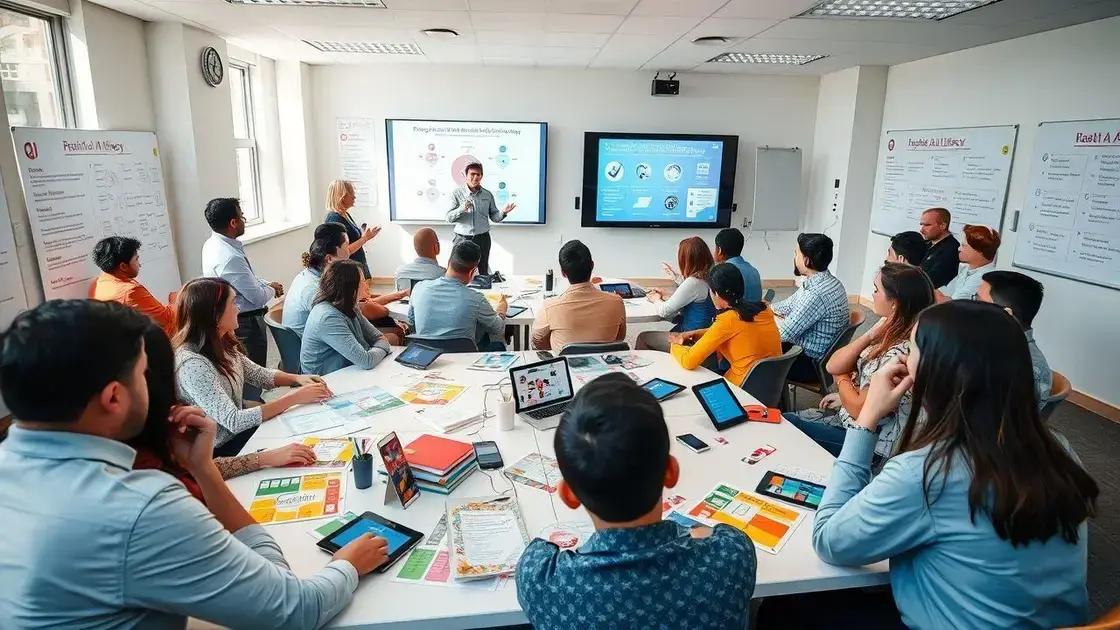Insights on ai literacy campaigns for effective learning

AI literacy campaigns focus on enhancing understanding of artificial intelligence through personalized learning, practical engagement, and collaboration between educational institutions and industry to prepare individuals for future job markets.
Insights on ai literacy campaigns highlight the growing need for understanding artificial intelligence. How do these campaigns improve digital literacy and empower individuals? Let’s dive into their impact.
Understanding ai literacy and its importance
Understanding ai literacy is crucial in today’s technology-driven world. It refers to the knowledge and skills needed to engage with artificial intelligence technologies. As these tools become more widespread, fostering this literacy helps individuals navigate the digital landscape effectively.
Ai literacy involves recognizing how AI systems work, their applications, and the impact they have on society. This understanding enables users to interact with AI responsibly and maximize its benefits. By being literate in AI, people can make informed decisions and engage critically with AI-driven solutions.
Why is ai literacy important?
The importance of ai literacy cannot be overstated. Here are some points highlighting its significance:
- Empowers individuals to make informed choices about technology.
- Prepares the workforce for future jobs that require AI skills.
- Promotes ethical use of AI and challenges biases inherent in its algorithms.
Moreover, as more sectors incorporate artificial intelligence, from healthcare to finance, individuals with adequate literacy can actively participate and advocate for transparency and fairness in these systems. This literacy is not just for experts; it should be accessible to everyone.
Building a foundation in AI literacy begins with education. Schools and organizations need to integrate AI concepts into their curricula, ensuring that learning is inclusive and comprehensive. Programs can teach AI fundamentals as well as practical applications, bolstering skills that will be essential in countless fields.
In conclusion, cultivating ai literacy is vital for both personal and professional development. As technology continues to evolve, understanding its implications and functionalities will be a powerful tool for all. By prioritizing AI education, we prepare for a future where everyone can engage with technology wisely and effectively.
Key strategies for effective ai literacy campaigns

Key strategies for effective ai literacy campaigns can empower individuals to understand and utilize artificial intelligence technologies. By focusing on certain methods, these campaigns can reach a broader audience and create a lasting impact. It’s essential for every campaign to design content that resonates with various demographics.
One effective strategy involves collaboration with community organizations. When local groups take part, they can tailor the message to their audience. This ensures that the information is relevant and engaging. Moreover, partnerships can provide resources that may not be available otherwise.
Engaging Learning Methods
Employing interactive and engaging methods is critical in ai literacy campaigns. People learn best through hands-on experience and real-life applications. Incorporating workshops, webinars, and practical demonstrations can enhance understanding and retention.
- Integrate real-world examples of AI use.
- Offer opportunities for participants to create their own AI projects.
- Utilize gamification to make learning enjoyable.
Additionally, campaigns should focus on accessibility. Providing resources in multiple formats can help cater to different learning styles. For instance, some may prefer video tutorials, while others might benefit from written materials or podcasts. Offering content in various languages also increases reach and inclusivity.
Another essential aspect is fostering a supportive community. Creating forums or online groups where participants can ask questions and share experiences encourages ongoing learning. This community aspect makes learning less intimidating and more collaborative. Peer support can significantly enhance confidence in understanding AI concepts.
Finally, measuring the effectiveness of these campaigns is vital. Feedback mechanisms allow organizers to assess what works and what doesn’t. Surveys and assessments can gather insights from participants about their learning experiences and outcomes. This information is invaluable for refining future initiatives and maximizing their impact.
Measuring the success of ai literacy initiatives
Measuring the success of ai literacy initiatives is crucial for understanding their impact and effectiveness. By evaluating these programs, organizers can identify strengths and weaknesses, allowing them to improve future efforts. Some key metrics to consider include participant engagement, knowledge retention, and long-term application of AI skills.
One way to measure success is through participant feedback. Surveys can provide insights into how learners felt about the program. Questions may cover clarity of materials, instructor effectiveness, and overall satisfaction. Gathering this information helps in refining the approach to better meet the needs of future participants.
Assessing Learning Outcomes
Another important metric is assessing the knowledge gained by participants. Pre- and post-program assessments can effectively gauge learning growth. For instance, participants could take a quiz before starting the program and another after completion. This method helps quantify the increase in understanding.
- Develop clear learning objectives for the program.
- Use various assessment methods, like quizzes and practical projects.
- Collect data on how knowledge is applied in real-world scenarios.
It’s also essential to track how well participants apply their new skills over time. Follow-up surveys, conducted a few months after the course, can reveal how many learners are actively using AI in their daily work or education. This long-term measurement indicates the real-world value of the literacy initiatives.
Networking opportunities created by the initiative can also reflect success. When participants continue to connect and share insights, it informs about the campaign’s ability to foster community. Building strong networks encourages ongoing learning and collaboration, which is vital in the rapidly evolving field of AI.
Ultimately, combining quantitative data with qualitative insights can provide a comprehensive view of an initiative’s success. This blended approach allows organizers to understand the holistic impact of their efforts, leading to more effective ai literacy initiatives in the future.
Future trends in ai literacy and education

Future trends in ai literacy and education are vital as technology rapidly evolves. Keeping up with these changes is crucial for learners and educators alike. As AI continues to integrate into various sectors, the demand for skilled individuals who understand these technologies will grow significantly.
One emerging trend is the use of personalized learning experiences. Artificial intelligence can tailor educational content based on individual needs and learning styles. For example, AI platforms can analyze a student’s progress and recommend specific resources, making learning more effective and enjoyable.
Integration of AI in Curriculum
Furthermore, many educational institutions are beginning to incorporate AI topics directly into their curricula. By teaching about AI fundamentals, ethics, and applications, educators provide students with essential knowledge. This integration prepares students not just to understand AI but to actively participate in shaping its future.
- Focus on critical thinking and problem-solving skills.
- Encourage collaboration on AI projects.
- Provide real-world scenarios for practical learning.
Another important aspect is the role of online learning platforms. With the rise of remote education, many individuals now have access to AI literacy courses from anywhere. These platforms often use gamification elements to boost engagement, making it easier for learners to grasp complex concepts.
In addition to these trends, the importance of lifelong learning is becoming evident. As AI technologies evolve, so must our skills. Individuals will need to embrace continuous education to keep pace with advancements. Workshops, webinars, and online courses can support this ongoing learning journey.
Finally, collaboration between educational institutions and industry is likely to grow. By partnering with businesses, schools can ensure that their AI literacy programs meet current job market needs. This alignment helps students develop the skills employers are looking for, making them more competitive in the workforce.
FAQ – Frequently Asked Questions About AI Literacy and Education
What is AI literacy?
AI literacy is the understanding and skills needed to engage with artificial intelligence technologies effectively.
How can I improve AI literacy in my organization?
You can improve AI literacy by offering workshops, online courses, and practical projects that encourage hands-on learning.
Why is AI literacy important for students?
AI literacy is important for students as it prepares them for future job markets where AI skills are increasingly in demand.
What are some effective strategies for teaching AI?
Effective strategies include personalized learning, interactive tools, and collaboration between schools and industries.





